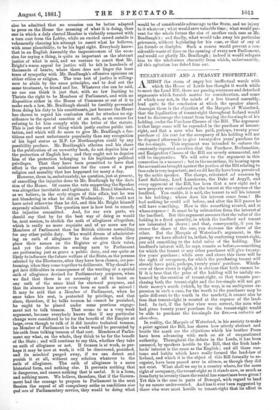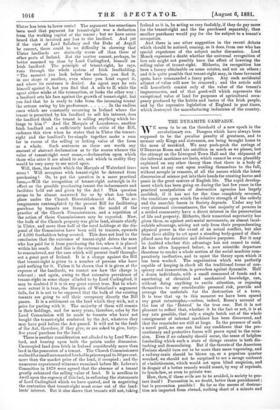TENANT-RIGHT AND A PEASANT PROPRIETARY. A MIDST the storm of angry
but ineffectual words with which the House of Lords has thought it worth while to meet the Land Bill, there are passing sentences and detached arguments which furnish matter for consideration, and some of which may not, in the minds of a less biassed assembly, lead quite to the conclusion at which the speaker aimed. Amongst these is the objection of the Marquis of Waterford, that the legalisation of tenant-right throughout Ireland would tend to discourage the tenant from buying the fee-simple of his holding, under the Purchase Clauses of the Bill. The argument is that large sums will be expended in the purchase of tenant- right, and that a man who has paid, perhaps, twenty years' purchase of his rent for the occupancy of his holding will not be disposed afterwards to give twenty-five years' purchase for the fee-simple. This argument was intended to enforce the constantly-repeated assertion that the Purchase, Reclamation, and Emigration Clauses of the Bill are merely ornamental, and will be inoperative. We will refer to the argument in this connection in a moment ; but in the meantime, its bearing upon the accusations brought against the portion of the Bill relating to free-sale is very important, and could hardly have been perceived by the noble speaker. The charge, reiterated ad nauseatn by Lord Salisbury, Lord Lansdowne, the Duke of Argyll, and every opponent of the Bill, has been that a new right and a new property were conferred on the tenant at the expense of the landlord. You enable, it is said, the tenant to sell his interest in his holding ; where does his interest come from ? He had nothing he could sell before, and after the Bill passes he will have something. How is this something created, and at whose expense ? It must be by subtraction from the interest of the landlord. But this argument assumes that the value of the holding is a fixed quantity, in which the landlord and tenant are interested in shares ; and that, consequently, if you in- crease the share of the one, you decrease the share 'of the other. But the Marquis of Waterford's argument, in the passage we have alluded to, is that, by conferring tenant-right, you add something to the total value of the holding. The landlord's interest will, he says, remain as before,—something for which the tenant or any other purchaser will give twenty- five years' purchase ; while over and above this there will be the right of occupancy, for which the purchasing tenant will already have paid, perhaps, twenty years' purchase. Which- ever of these views is right, it is obvious that both cannot be. If it is true that the pries of the holding will be unduly en- hanced by the creation of tenant-right, so that tenants pur- chasing both the tenant-right and the fee-simple will not get their money's worth (which, by the way, is an ambiguous ex- pression in such a case, for the worth to the purchaser may be quite different to the worth in the market), it cannot also be true that tenant-right is created at the expense of the land- lord. In fact, if the latter view were correct, the man who had given twenty years' purchase for the tenant-right would be able to purchase the fee-simple for five,—a reductio ad absurdum.
In reality, the Marquis of Waterford, in his anxiety to make a point against the Bill, has shown how utterly abstract and beside the mark are the objections which his brother Peers have been advancing with such an air of unquestioned authority. Throughout the debate in the Lords, it has been assumed, by speakers hostile to the Bill, that the Irish land- lords' interest is the same as the English ; and all those cus- toms and habits which have really formed the land-law of Ireland, and which it is the object of this Bill formally to re- cognise, have been passed over in silence, as though they did not exist. What shall we say to a country where, for the mere right of occupancy, the tenant-right as it stands now, as much as from forty to seventy times the rental has sometimes been given ? Yet this is the case in parts of Donegal, with regard to land by no means under-rented. And has it ever been suggested by those who were most hostile to tenant-right that its effect in Ulster has been to lower rents? The argument has sometimes been used that payment for tenant-right was a deduction from the working capital of the tenant ; but we have never heard that it involved any loss to the landlord. And yet if the view of Lord Salisbury and the Duke of Argyll be correct, there could be no difficulty in showing that Ulster landlords are distinctly worse off than those of other parts of Ireland. But the matter cannot, perhaps, be better summed up than by Lord Carlingford, himself an Irish landlord. The principle of tenant-right, he says, runs through the whole system of Irish landholding. "The moment you look below the surface, you find it, in one shape or another, even where you least expect it, and where its existence is denied. An agent says he sets himself against it, but you find that A sells to B, while the agent either winks at the transaction, or looks the other way ; a landlord sets his face against the growth of tenant-right, but you find that he is ready to take from the incoming tenant the arrears owing by his predecessor In the endless cases which are constantly occurring in Ireland where the tenant is permitted by his landlord to sell his interest, does the landlord think the tenant is selling anything which be- longs to him ?" And the Marquis of Lansdowne, another Irish landlord and a sufficiently hostile critic of the Bill, endorses this view when he states that in Ulster the tenant- right and the landlord's fee-simple together make a sum far in excess of the selling or letting value of the farm as a whole. Such sentences as these are worth any amount of abstract declamation as to the source whence the value of tenant-right must come,—declamation upon which those who utter it are afraid to act, and which in reality they would be very sorry to see acted upon.
Will, then, the result which the Marquis of Waterford fears occur ? Will occupiers with tenant-right be deterred from purchasing ? Or, to put the question in a more practical form,—Will the recognition of tenant-right outweigh in its effect on the possible purchasing tenant the inducements and facilities held out and given by the Act This question seems to be almost answered for us by what has taken place under the Church Disestablishment Act. The ar- rangements contemplated by the present Bill for facilitating purchase by tenants are framed on the model of the practice of the Church Commissioners, and a repetition of the action of those Commissioners may be expected. Now, the bulk of the Church property was glebe land, situate chiefly in Ulster, and more than half of the total holdings at the dis- posal of the Commission have been sold to tenants, upwards of 4,000 freeholders being created. This does not lead to the conclusion that the existence of tenant-right deters the man who has paid for it from purchasing the fee, when it is placed within his reach. And this is the extreme case,—but, it must be remembered, not the case which will present itself through- out a great part of Ireland. It is a charge against the Bill that tenant-right is given to a number of persons who have paid nothing for it. Unless it be shown that it is given at the expense of the landlords, we cannot see how the charge is relevant ; and again, owing to that extensive prevalence of tenant-right in some shape alluded to by Lord Carlingford, it may be doubted if it is to any great extent true. But to what- ever extent it is true, the Marquis of Waterford's argument fails, for it is not to be supposed that the bulk of the existing tenants are going to sell their occupancy directly the Bill passes. It is a settlement on the land which they wish, not a price for parting with it. The majority of them will remain in their holdings, and for many years, therefore, sales by the Land Commission will be made to tenants who have not bought the tenant-right conferred by the Act, whatever they may have paid before the Act passed. It will not be the fault of the Act, therefore, if they give, or are asked to give, forty- five years' purchase for the land.
There is another consideration not alluded to by Lord Water- ford, and bearing upon both the points under discussion. Unoccupied land does fetch in Ireland considerably more than land in the possession of a tenant. The Church Commissioners realised for small un tenanted freeholds prices equ al to 50 per cent. more than the market price of the land, if occupied ; and the numerous experienced witnesses examined before Mr. Lefevre's Committee in 1878 were agreed that the absence of a tenant greatly enhanced the selling value of land. It is needless to dwell upon the cogency of this fact, in enforcing the statements of Lord Carlingford which we have quoted, and in negativing the contention that tenant-right must come out of the land- lords' interest. But it also shows that tenants will not, taking Ireland as it is, be acting so very foolishly, if they do pay more for the tenant-right and the fee purchased separately, than another purchaser would pay for the fee subject to a tenant's occupation.
And there is one other suggestion in the recent debate which should be noticed, coming, as it does, from one who has special experience of the subject under discussion. Lord Monck expressed a doubt whether the universal recognition of free sale might not possibly have the effect of lowering the selling value of tenant-right. Hitherto, its recognition has been a luxury obtainable on some estates, and not on others ; and it is quite possible that tenant-right may, in these favoured spots, have commanded a fancy price. Any such accidental adjunct of value will now be removed ; and the article sold will henceforth consist only of the value of the tenant's improvements, and of that good-will which represents the exceptional value of land for purposes of agricultural occu- pancy produced by the habits and tastes of the Irish people, and by the repressive legislation of England in past times, which destroyed the manufacturing industries of the country.































 Previous page
Previous page